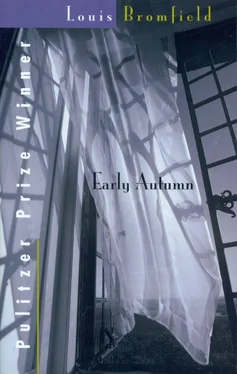“Olivia, my dear …” The old man was speaking. “Will you have your coffee with me in the library? There is something I want to discuss with you.”
She knew it then. She had been right. There was something which troubled him. He always said the same thing when he was faced by some problem too heavy for his old shoulders. He always said, “Olivia, my dear. … Will you come into the library?” He never summoned his own son, or his sister Cassie … no one but Olivia. Between them they shared secrets which the others never dreamed of; and when he died, all the troubles would be hers … they would be passed on for her to deal with … those troubles which existed in a family which the world would have said was rich and respected and quite without troubles.
4
As she left the room to follow him she stopped for a moment to say to Sybil, “Are you happy, my dear? You’re not sorry that you aren’t going back to school in Saint-Cloud?”
“No, Mama; why shouldn’t I be happy here? I love it, more than anything in the world.”
The girl thrust her hands into the pockets of her riding-coat.
“You don’t think I was wrong to send you to France to school … away from everyone here?”
Sybil laughed and looked at her mother in the frank, half-mocking way she had when she fancied she had uncovered a plot.
“Are you worrying about marrying me off? I’m only eighteen. I’ve lots of time.”
“I’m worrying because I think you’ll be so hard to please.”
Again she laughed. “That’s true. That’s why I’m going to take my time.”
“And you’re glad to have Thérèse here?”
“Of course. You know I like Thérèse awfully, Mama.”
“Very well … run along now. I must speak to your grandfather.”
And the girl went out onto the terrace where Jack stood waiting in the sun for the trap. He always followed the sun, choosing to sit in it even in midsummer, as if he were never quite warm enough.
She was worried over Sybil. She had begun to think that perhaps Aunt Cassie was right when she said that Sybil ought to go to a boarding school with the girls she had always known, to grow loud and noisy and awkward and play hockey and exchange silly notes with the boys in the boarding school in the next village. Perhaps it was wrong to have sent Sybil away to a school where she would meet girls from France and England and Russia and South America … half the countries of the world; a school where, as Aunt Cassie had said bitterly, she would be forced to associate with the “daughters of dancers and opera singers.” She knew now that Sybil hadn’t liked the ball any more than Thérèse, who had run away from it without a word of explanation. Only with Thérèse it didn’t matter so much, because the dark stubborn head was filled with all sorts of wild notions about science and painting and weird books on psychology. There was a loneliness about Thérèse and her mother, Sabine Callendar, only with them it didn’t matter. They had, too, a hardness, a sense of derision and scorn which protected them. Sybil hadn’t any such projections. Perhaps she was even wrong in having made of Sybil a lady—a lady in the old sense of the word—because there seemed to be no place for a lady in the scheme of life as it had existed at the dance the night before. It was perilous, having a lady on one’s hands, especially a lady who was certain to take life as passionately as Sybil.
She wanted the girl to be happy, without quite understanding that it was because Sybil seemed the girl she had once been herself, a very part of herself, the part which had never lived at all.
She found her father-in-law seated at his great mahogany desk in the high narrow room walled with books which was kept sacred to him, at the desk from which he managed the farm and watched over a fortune, built up bit by bit shrewdly, thriftily over three hundred years, a fortune which he had never brought himself to trust in the hands of his son. It was, in its gloomy, cold way, a pleasant room, smelling of dogs and apples and wood smoke, and sometimes of whiskey, for it was here that the old man retired when, in a kind of baffled frenzy, he drank himself to insensibility. It was here that he would sometimes sit for a day and a night, even sleeping in his leather chair, refusing to see anyone save Higgins, who watched over him, and Olivia. And so it was Olivia and Higgins who alone knew the spectacle of this solitary drinking. The world and even the family knew very little of it—only the little which sometimes leaked out from the gossip of servants straying at night along the dark lanes and hedges about Durham.
He sat with his coffee and a glass of Courvoisier before him while he smoked, with an air of being lost in some profound worry, for he did not look up at once when she entered, but sat staring before him in an odd, enchanted fashion. It was not until she had taken a cigarette from the silver box and lighted it that he looked up at the sound of the striking match and, focusing the burning black eyes, said to her, “Jack seems very well today.”
“Yes, better than he has been in a long time.”
“Perhaps, after all, the doctors are wrong.”
Olivia sighed and said quietly, “If we had believed the doctors we should have lost him long ago.”
“Yes, that’s true.”
She poured her coffee and he murmured, “It’s about Horace Pentland I wanted to speak. He’s dead. I got the news this morning. He died in Mentone and now it’s a question whether we shall bring him home here to be buried in Durham with the rest of the family.”
Olivia was silent for a moment and then, looking up, said, “What do you think? How long has it been that he has lived in Mentone?”
“It’s nearly thirty years now that I’ve been sending him money to stay there. He’s only a cousin. Still, we had the same grandfather and he’d be the first of the family in three hundred years who isn’t buried here.”
“There was Savina Pentland. …”
“Yes. … But she’s buried out there, and she would have been buried here if it had been possible.”
And he made a gesture in the direction of the sea, beyond the marshes where the beautiful Savina Pentland, almost a legend now, lay, somewhere deep down in the soft white sand at the bottom of the ocean.
“Would he want to be buried here?” asked Olivia.
“He wrote and asked me … a month or two before he died. It seemed to be on his mind. He put it in a strange way. He wrote that he wanted to come home.”
Again Olivia was thoughtful for a time. “Strange …” she murmured presently, “when people were so cruel to him.”
The lips of the old man stiffened a little.
“It was his own fault… .”
“Still … thirty years is a long time.”
He knocked the ash from his cigar and looked at her sharply. “You mean that everything may have been forgotten by now?”
Olivia made a little gesture with her white, ringless hands. “Why not?”
“Because people don’t forget things like that … not in our world, at any rate.”
Quietly, far back in her mind, Olivia kept trying to imagine this Horace Pentland whom she had never seen, this shadowy old man, dead now, who had been exiled for thirty years.
“You have no reason for not wanting him here among all the others?”
“No … Horace is dead now. … It can’t matter much whether what’s left of him is buried here or in France.”
“Except, of course, that they may have been kinder to him over there. … They’re not so harsh.”
A silence fell over them, as if in some way the spirit of Horace Pentland, the sinner whose name was never spoken in the family save between Olivia and the old man, had returned and stood between them, waiting to hear what was to be done with all that remained of him on this earth. It was one of those silences which, descending upon the old house, sometimes filled Olivia with a vague uneasiness. They had a way of descending upon the household in the long evenings when all the family sat reading in the old drawing room—as if there were figures unseen who stood watching.
Читать дальше












